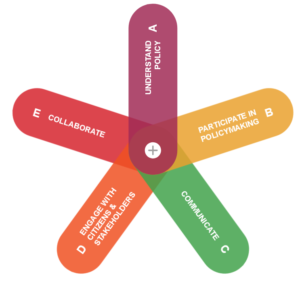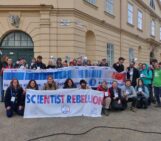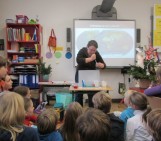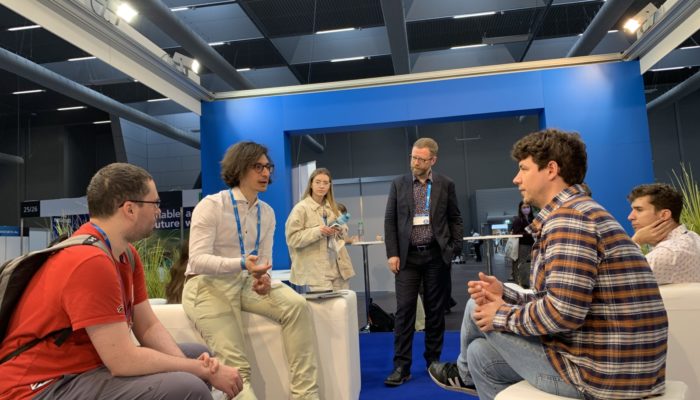
EGU’s Science for Policy Working Group aims to promote greater collaboration between the geoscientific community and policymakers, highlight policy-relevant outputs from EGU scientists, and support evidence-based policy. Not only does the Working Group support EGU’s policy activities but it also provides individual members with relevant information and opportunities through the EGU’s Science for Policy Newsletter, webinars, and sessions at the General Assembly.
As part of the EGU’s 20th Anniversary, the Working Group has put together a list of their top 10 most useful resources for scientists who want to have policy impact in Europe! Below you’ll find resources with information about how to engage, practical examples, science-policy networking platforms, and tools that will help you understand the policymaking process!
1. The JRC’s Science for Policy Handbook
The Joint Research Centre (JRC), the European Commission’s in-house science and knowledge service, aims to bring evidence into the EU policymaking process. In 2020, the JRC published an open access Science for Policy Handbook that provides advice for scientists and scientific organisations interested in bringing their research to the attention of policymakers. It focuses on how scientists can bridge the science-policy gap, effectively communicate with policymakers, and achieve policy impact. The free Handbook provides information useful for anyone involved in European-based policy or hoping to engage more with policy in the future!
2. SAPEA podcast
SAPEA (Science Advice for Policy by European Academies) is part of the European Commission’s Scientific Advice Mechanism. It provides independent scientific advice to Commissioners to support their decision-making while strengthening connections between Europe’s academies and stimulating debate in Europe about the role of evidence in policymaking. In 2020, SAPEA created a podcast that features those working on the interface of science and policy and provides insights and inspiration to others who are hoping to get involved in policy in the future.
3. The Legislative Train
Understanding the policymaking and who needs what information and when is key to effectively engaging in the policymaking process. The European Parliament’s Legislative Train details when a piece of legislation arrives at the Parliament and how it is being processed. This includes what phase the proposal is currently in, the Committee overseeing the proposal, the MEP responsible, and related legislations. This is particularly useful when looking into detailed policies and strategies that have many components such as the European Green Deal.
4. The EGU’s External Science for Policy Events Calendar
Attending a policy-related event can introduce you to the science-policy interface or a particular policy area, help you to gain a better understanding about the needs of policymakers, provide inspiration for future research, connect your with potential collaboration partners outside of academia, and allow you to promote your work and expertise. The EGU has a regularly updated External Science for Policy Events Calendar that lists upcoming policy-related events that are likely to be of interest to our members. You can also add a policy-related event to this calendar if you’d like to share it with a wider audience.
5. The Competence Framework ‘Science for Policy’ for Researchers
The European Commission Joint Research Centre’s Competence Framework ‘Science for Policy’ for Researchers outlines 27 different competences
that researchers and organisations can develop to connect with policymakers, provide relevant, robust and timely information, and effectively create policy impact. Each competence includes four progression levels, from foundational to expert level along with associated attitudes, skills, and knowledge that is required to move through each stage. This enables individual researchers and organisations to self-assess their perceived levels and map their team’s competence strengths and weaknesses. You can read a longer summary of the Competence Framework in this GeoPolicy Blog post.
6. The JRC’s Knowledge4Policy Platform
The European Commission Joint Research Centre’s Knowledge4Policy Platform aims to bridge the science-policy gap by bringing evidence for policy, direct from scientists to policymakers, across Europe. It aims to mobilise people and resources to “create, curate, make sense of and use knowledge to inform policymaking across Europe” and features regular posts on science for policy-related topics. You can make your own Knowledge4Policy Platform profile here and start connecting with others who are working on the science-policy interface today!
7. The EU Academy Course, Maximise your Policy Impact
The EU Academy has a wide-variety of trainings and short videos that may be on interest to EGU Members. The 60-minute course, Science for Policy – Maximise your Policy Impact is particularly relevant for EGU members who would like to get an overview of the science-policy interface in Europe. It highlights the skills scientists need to better engage with policymakers including how to understand your audience better, appreciate the different language used by scientists and policymakers, and get your key messages across with confidence.
8. The European Commission’s Have your say platform
The EU’s Better Regulation Agenda aims to ensure that EU actions based on evidence and that citizens, businesses, and stakeholders are involved in the decision-making process. To support this, the European Commission’s Have your say platform provides citizens and organisations with the opportunity provide feedback on all legislation changes through consultations that are proposed by the European Commission.
Answering Consultations and providing feedback on legislation is not only a great way of providing feedback, either from a science-based or personal perspective, but it can help you gain a better understanding of policy-relevant topics and issues that require greater scientific support. The Good Lobby has also created the How to Submit Feedback to An EU Public Consultation guide that is a useful tool when you’re thinking about how to effectively provide feedback. If you’d like to see an example of how a scientific organisation has provided feedback to a Consultation, you can have a look at the feedback submitted by the EGU Biodiversity Task Force on the proposed EU Nature Restoration Law.
he
9. Ten Tips for Researchers: How to achieve impact on policy
This JRC resource is a compact list of steps that researchers and research organisations can use to improve their policy impact. It outlines why it’s important for researchers to question the questions and improve their knowledge of the policy landscape by becoming bilingual in both science and policy.
10. The EGU Science for Policy Newsletter
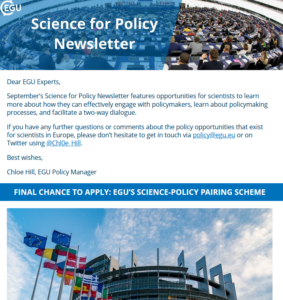 The EGU’s Science for Policy Newsletter is distributed on a monthly basis and includes a range of resources and upcoming policy opportunities that are relevant for EGU members. These include EGU’s policy activities and initiatives but also external events, pairing scheme, resources, relevant EU policy updates, podcasts, and consultations. If you’ve found this list useful, it’s likely that you’ll also enjoy receiving these monthly updates! You can subscribe to the newsletter here.
The EGU’s Science for Policy Newsletter is distributed on a monthly basis and includes a range of resources and upcoming policy opportunities that are relevant for EGU members. These include EGU’s policy activities and initiatives but also external events, pairing scheme, resources, relevant EU policy updates, podcasts, and consultations. If you’ve found this list useful, it’s likely that you’ll also enjoy receiving these monthly updates! You can subscribe to the newsletter here.
The EGU has a regularly updated policy resources page with links to other external resources and information that we think will be of interest to our members. You can see the full policy resource list here and suggest a resource for this page by emailing policy@egu.eu.

